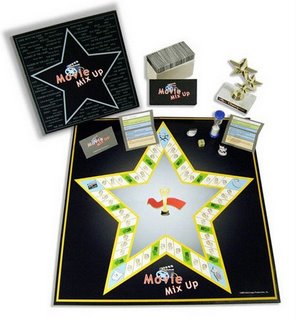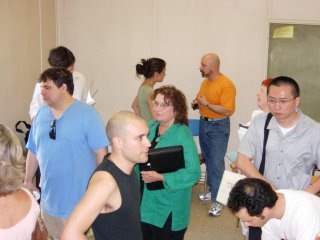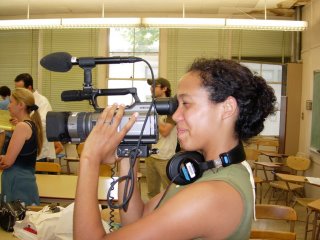"HEAT"
"Heat” is a buzz term referring to the excitement and hype one might find with a particular Hollywood commodity that makes it more attractive in the marketplace.
There was plenty of heat in a particular screenwriting class this past month in the San Fernando Valley. However, with tongue-in-cheek, I’m using the term here metaphorically.
I’ll get to that in a moment.
I should begin by saying it is my belief that screenwriting cannot be taught.
So it is with a great deal of irony that I set out twice a year to teach
a screenwriting class at Los Angeles Valley College.


When I was an undergraduate, I studied to be a teacher and, afterwards, taught for
the (former) New York City Board of Education. I also taught basic writing skills to incarcerated men in the New York State penal system, along with developing and spearheading other sorts of various educational programs. Upon receiving my master’s degree, I was awarded NYU’s Public Service Prize (for my “dedication to public education”). Teaching has always been in my blood – which works at cross-purposes with my belief that screenwriting can’t be taught.
Then, of course, there’s the small detail that I’m not a screenwriter.
But my experience of working with scripts and writers and a bird’s eye view of how the business operates, along with a need to teach, motivates me to journey to the city college campus and attempt to help students learn what makes a screenplay work and how to navigate the minefield of Hollywood.
My objective is to present a realistic view of the industry. There is a glamourization of screenwriting and Hollywood which is perpetuated by those who sell books and seminars and services – often the only link that outsiders have to the business. For instance, it would be counterproductive for the Screenwriting Expo to hold a seminar called “YOU’LL NEVER SELL A SCRIPT, ASSHOLE.” Since my income doesn’t rely on this class, I make it perfectly clear that most struggling writers are merely spinning their wheels. However, with talent and a lot of savvy perseverance, there is a shot, and the class attempts to identify certain variables that could make the road easier (though no less unpredictable).
Aside from discussing the basics of story structure and character development, the class focuses on reading recently sold spec scripts and banging out story concepts, amongst other things. I like to bring in guests too – agents, managers and writers. This time around I brought in screenwriters Cindy McCreery and Mike Gozzard.
While their names are not as well known as the likes of William Goldman or Shane Black, they are working screenwriters who still have to pound the pavement for their next job. Their experiences are far more relatable to new screenwriters hoping to earn a living; their experiences are more akin to the majority of writers who eek out a paycheck in the WGA. (Mike, for instance, just had his first movie produced starring Terrence Howard and Bernie Mac and is still searching for an agent!)
In spite of my instructional objectives, the class eventually evolves into more of a social scene – less classroom instruction and more discussion of scripts and the business. Someone often brings in a few boxes of bakery goods for breakfast. It’s sort of a dramaturgical coffee klatch where writers can gather to learn the craft, discuss ideas, have a few laughs and even make new friends.
Los Angeles Valley College is located in Valley Glen (a euphemism for Van Nuys) at Coldwater and Burbank. The classroom is in BUGALOW 31, which looks something like a single-wide in an Oklahoma trailer park.


This July has been the hottest that I can recall, and the classroom was
sweltering.
This is the "heat" I was referring to earlier.
Located right off a parking lot, the blacktop generated heat, turning B31 into a microwave oven. The class met for six consecutive Saturdays starting June 17th, and each Saturday was the hottest day of the week. (Thursday would be 90 degrees; Friday would be 90 degrees but Saturday was always 103 degrees). With triple digits outside, the room felt hotter inside. The wall mounted air conditioner was powerless against the Valley sun. (My “Honeywell” oscillating fan did manage to circulate the hot air through the room, providing a tropical breeze.)
Despite the suffocating conditions, the students arrived each week (having paid $90.00 to do so) with scripts and ideas in tow. The student body was an eclectic bunch – with ages ranging from college students to senior citizens. Although they come from different walks of life, their goals are the same: Write a script that could open doors to a career.
I've read so many scripts and rarely meet the writers behind any of them, so facilitating this class is a way to put a face to the anonymous. It’s a way to learn a little bit about the people who write scripts for no remuneration - with the hopes of tasting a piece of the Hollywood pie.
Robert, for instance, works for myspace.com (and had the best pitch of the class); Brenda is a chipper mother of four, three of them triplets; Mike is a chiropractor in Simi Valley; Vanessa was visiting from Harvard and documented the class for a film project.
Teaching this class helps me to humanize the inhuman (and often inhumane) process of sifting through thousands of screenplays.
Bryan and Marge are recidivists – having taken the class before. Bryan is a writer/director who produced his own film (with Marge) called ALONG FOR THE RIDE. He developed another script in class called CROOKED CREEK, which is in pre-production. However, inspired by the discussion of loglines in class, they developed a board game called MOVIE MIX-UP.


The game creates trivia questions by combining loglines from two movies starring the same actor. “A slow witted Southern man who runs very fast struggles to return to Earth in a crippled spacecraft” would be an example of a logline from their game. In order to advance around the board, players need to guess the titles (using the vernacular “meets”): FORREST GUMP meets APOLLO 13, or guess the actor (Tom Hanks) or guess the directors (R. Zemeckis and R. Howard, respectively) or guess the release dates (1994 & 1995). The couple has even created a TV version of the game and is pitching it around town. I recently brought Bryan in to meet the agent trainees - all forty of them - who read and critiqued his script in a story conference setting.
I met Kat and JD several years ago at the Las Vegas Screenwriting Conference (where the heat rivaled that of LAVC). Kat is a former Los Angeles County Sheriff’s Deputy who raises horses and writes. Her writing partner JD recently penned a children’s book called “The Gingerbread Cowboy.” They pitched a promising idea that lacked a good hook, until fellow student Heather chimed in with a facile yet clever fix that flipped the concept around. Moments like that cannot be taught. But it’s those sorts of sparks that make the class worthwhile and, I think, enable students to understand and learn the craft.
Sheila H. Forman, a psychologist and lawyer, has penned two self-help books. She met Piper Moretti in class. Piper produces (the unfortunately titled but very important) YOUR CANCER TODAY in Orange Country and asked Sheila to appear as a guest. Networking is the lifeblood of this business and one never knows where a relationship can possibly lead.






Savannah is originally from the South – a sweet, Elysian creature who really got a kick out of reading the spec scripts. One day while someone was floundering in a pitch, she had an epiphany about the pitching process and immediately shared it with the class. It was like the Helen Keller moment in THE MIRACLE WORKER (“wah-wah”) and a highlight of the six-weeks. Savannah is an actress who recently starred in the title role of NURSIE opposite C. Thomas Howell.
Class alumni have formed a writers’ group that meets once a month at the Marie Callender’s in Sherman Oaks. (One of the waiters, an aspiring screenwriter himself, joined the group.) Aside from script talk, there is plenty of food and air conditioning.
This summer’s heat was sort of a metaphor, representing the pervasive obstacles of carving out and sustaining a career in Hollywood.
But, I think, in the end, the students beat the heat.
I hope that victory is a metaphor too.
Our final class was Saturday July 22 and while we baked, Pierce College - the sister school to LAVC located ten miles away in Woodland Hills - reported the highest temperature ever recorded in the history of Los Angeles County: 119 degrees!










PHOTOS:
1) LOS ANGELES VALLEY COLLEGE, FULTON ENTRANCE
2) SOPHISTICATED ROOM NUMBERING SYSTEM
3) MOVIE MIX UP BOARD GAME
4) DR. SHEILA
5) PIPER
6) SAVANNAH
7) THE CLASS KIBBITZING
8) ROBERT TALKS TO JD & KAT
9) BRENDA
10) VANESSA
11) A CLASS WITH HEAT
A special thanks to all the LAVC Summer of '06 students, and an immense amount of gratitute to Jacinthe (of twoadverbs), who is a genuine lifesaver.
Send questions to theinsidepitch@sbcglobal.net

